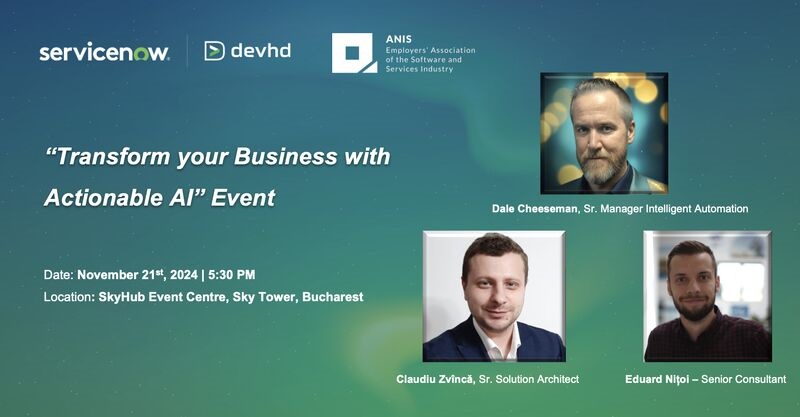Devhd: Adopting artificial intelligence (AI) is becoming a strategic priority for companies in Europe, including Romania

Organizations in Central and Eastern Europe (CEE), including companies in Romania, recognize the potential of AI and GenAI technologies in increasing productivity and capitalizing on internal skills and are willing to invest in them in the coming years – this is the conclusion of the “Transform your Business with Actionable AI” event, recently organized by Devhd, ServiceNow Premier Partner.
The event, which took place on November 21 in Bucharest, presented how AI is revolutionizing the automation of business processes in organizations through the ServiceNow platform, analyzing the impact of AI in solutions such as IT Service Management, Customer Service Management and HR Service Delivery.
An IDC study estimates that the adoption of artificial intelligence will generate a global economic impact of $19.9 trillion and contribute 3.5% to global GDP by 2030. AI will influence jobs globally, impacting multiple industries. Almost 98% of business leaders consider AI a priority for their organizations.
Another study, conducted by Implement Consulting Group, at the request of Google, highlights the significant impact of generative AI in Central and Eastern Europe. Thus, 45% of companies in CEE expect a significant increase in productivity in the next five years due to generative AI. The manufacturing sector in CEE is considered a major area of interest, with high potential for the implementation of these technologies.
What are the concrete benefits for companies that invest in ServiceNow’s AI solutions?
1. Streamline data access and save time. AI Search, for example, allows teams to instantly access essential information available in the company’s infrastructure, saving time and increasing efficiency. With AI Search, a global services company reduced its average information search time by 40%, allowing teams to focus on strategic activities.
2. Reduce repetitive tasks and improve customer satisfaction. The renowned international organization Coursera reduced its number of escalated incidents by 30% and increased employee satisfaction to over 95% thanks to GenAI capabilities. Thus, teams were able to focus on value-added activities.
3. Manage incidents much more efficiently, eliminating many of the bottlenecks Now Assist, for example, allows for the reduction of repetitive incidents managed manually, providing faster and more efficient resolution. A large US insurance provider, USI, reduced average incident resolution time by 18% by automating the triage process.
4. Automate and standardize service delivery. GenAI solutions can help companies standardize and automate processes, saving time and improving user experience. Teleperformance, a global leader in customer support, implemented Predictive Intelligence and Process Mining to standardize processes and eliminate redundant steps, reducing resolution times by 25% and increasing the efficiency of critical processes.
5. Automate and increase IT team productivity. GenAI can transform service management workflows by providing instant access to software development tools and workflows for each department. After implementing GenAI on the ServiceNow platform, an IT organization saw a 22% increase in programmer productivity and an 18% reduction in incident escalation time.
6. Revolutionize Customer Support. GenAI solutions can streamline and scale customer support, allowing teams to focus on high-impact issues. Teleperformance also achieved a 99% customer satisfaction rate, up from 80%, by using GenAI capabilities in customer support automation. Automating incident summarization and automatically generating resolution notes saved between 15 and 25 minutes for each major incident.
7. Improve productivity with Predictive Intelligence Predictive Intelligence, for example, can help teams quickly identify patterns and anticipate incidents, ensuring proactive and efficient incident management. In the case of an international digital services organization, 35% of the time dedicated to analysis was saved, thus enabling faster decision-making.















